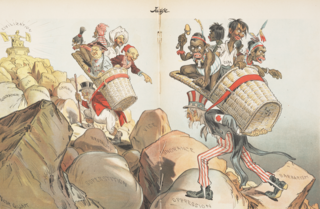
Joseph Rudyard Kipling was an English novelist, short-story writer, poet, and journalist. He was born in British India, which inspired much of his work.
Bond or bonds may refer to:

"The Man Who Would Be King" (1888) is a story by Rudyard Kipling about two British adventurers in British India who become kings of Kafiristan, a remote part of Afghanistan. The story was first published in The Phantom 'Rickshaw and Other Tales (1888); it also appeared in Wee Willie Winkie and Other Child Stories (1895) and numerous later editions of that collection. It has been adapted for other media a number of times.

The Jungle Book (1894) is a collection of stories by the English author Rudyard Kipling. Most of the characters are animals such as Shere Khan the tiger and Baloo the bear, though a principal character is the boy or "man-cub" Mowgli, who is raised in the jungle by wolves. Most stories are set in a forest in India; one place mentioned repeatedly is "Seeonee" (Seoni), in the central state of Madhya Pradesh.

"If—" is a poem by English poet Rudyard Kipling (1865–1936), written circa 1895 as a tribute to Leander Starr Jameson. It is a literary example of Victorian-era stoicism. The poem, first published in Rewards and Fairies (1910) following the story "Brother Square-Toes", is written in the form of paternal advice to the poet's son, John.
Narrative exposition, now often simply exposition, is the insertion of background information within a story or narrative. This information can be about the setting, characters' backstories, prior plot events, historical context, etc. In literature, exposition appears in the form of expository writing embedded within the narrative.

Burwash, archaically known as Burghersh, is a rural village and civil parish in the Rother district of East Sussex, England. Situated in the High Weald of Sussex some 15 miles (24 km) inland from the port of Hastings, it is located five miles (8 km) south-west of Hurst Green, on the A265 road, and on the River Dudwell, a tributary of the River Rother. In an area steeped in history, some nine miles (14 km) to the south-east lies Battle Abbey and eight miles (13 km) to the east is Bodiam Castle.

Kipling is the western terminus station of Line 2 Bloor–Danforth of the Toronto subway system. The station is served by buses and subway trains operated by the Toronto Transit Commission and is adjacent to the Kipling GO Station on the Milton line of GO Transit and the Kipling Bus Terminal, where passengers can connect with MiWay and GO Transit bus services. It is located in the Islington–City Centre West neighbourhood on St. Albans Road at Aukland Road, west of the overpass of Kipling Avenue, after which the station is named. The 900 Airport Express bus route connects Kipling to the Toronto Pearson International Airport.

Kipling Avenue is a street in the cities of Toronto and Vaughan in Ontario, Canada. It is a concession road, 6 concessions (12 km) west from Yonge Street, and is a major north–south arterial road. It consists of three separate sections, with total combined length of 26.4 km. (16.4 mi.).

John Lockwood Kipling was an English art teacher, illustrator and museum curator who spent most of his career in India. He was the father of the author Rudyard Kipling.

"The White Man's Burden" (1899), by Rudyard Kipling, is a poem about the Philippine–American War (1899–1902) that exhorts the United States to assume colonial control of the Filipino people and their country. Originally written to celebrate the Diamond Jubilee of Queen Victoria, the jingoistic poem was replaced with the sombre "Recessional" (1897), also a Kipling poem about empire.
Kipling is a town in southeast Saskatchewan, Canada. In provincial politics, Kipling is in the constituency of Moosomin. The town was named after the English author Rudyard Kipling.
John Lockwood may refer to:
"Lispeth" is a short story by Rudyard Kipling. It was first published in the Civil and Military Gazette on 29 November 1886; its first appearance in book form was in the first Indian edition of Plain Tales from the Hills in 1888, and it later appeared in subsequent editions of that collection. The tale is an interesting example of Kipling's attitudes to different races and cultures, which is less simple than many accounts of his beliefs allow.

Alice Caroline Kipling was one of the MacDonald sisters, Englishwomen of the Victorian era, four of whom were notable for their contribution to the arts and their marriages to well-known men. A writer and poet, she was the mother of the author Rudyard Kipling, aunt of British Prime Minister Stanley Baldwin, and sister-in-law of Edward Poynter and Edward Burne-Jones.

Kipling is a crater on Mercury. It has a diameter of 164 kilometers. Its name was adopted by the International Astronomical Union (IAU) in 2010. Kipling is named for the British author Rudyard Kipling, who lived from 1865 to 1936.

Kipling Trail is the old walking route that connects Dehradun with the hill station of Mussoorie in India. It was the only means of reaching Mussoorie before the cart roads, for tongas, or roads for automobiles were constructed. It is named after the English novelist Rudyard Kipling, who is believed to have walked the trail in the 1880s, though there is no definite evidence. The trail fell out of use when cars or buses became the preferred mode of transport, but the route is being revived by nature, colonial history and hiking enthusiasts.











